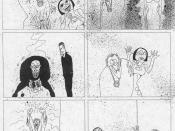In Jane Smiley's "A Thousand Acres", the main focus is one of the family and familial relationships. Smiley presents what at first seems to be a typical American farm family, but is quickly revealed to be anything but. Her message is quite clear (since she stole it from Shakespeare); love in its very nature is something one cannot measure, attempting to do so can only lead to disaster. However, Smiley has put a new spin on the love involved in the love test, a sort of hybrid of "honor thy mother and thy father" and an Oedipal complex, not true love, but what comes only with one type of love; the love of a man and a woman. This love cannot be transferred to other types of love, that of father and daughter. Smiley's novel revolves around the consequences of confusing lust with love, and the love of a wife with the love of a daughter.
Telling the novel only through Ginny's perspective serves to clarify and focus the events through the lens of a child's fragile, blind love. However, this love is a clingy, needy love that her father cannot return, not true love: "'Well, Daddy, it looks like we picked all the same things.' He ignored me" (218), and thus Ginny has sown the seeds of her own demise. She falls prey to it as soon as she expects her father to return her "love" in the same fashion that she expresses it, namely, by being bloody annoying. Smiley is portraying how not to show one's love, and she does so with each of the children in the novel.
With Rose, Smiley portrays an aggressive love, with a demanding nature, one that her father cannot match. Her loved, also attention based, relies more on...



Pretty thorough
This essay is pretty thorough and detailed but has too much repetition of the word "love". I know that the essay's theme is about "love" but you could have used other words. I don't know, maybe its just me.
0 out of 0 people found this comment useful.